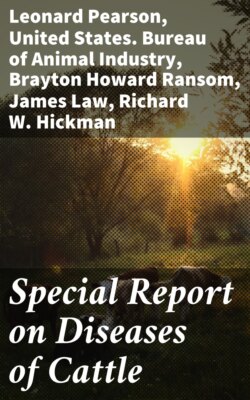Читать книгу Special Report on Diseases of Cattle - Lowe - Страница 50
На сайте Литреса книга снята с продажи.
DISEASES OF THE PERITONEUM. PERITONITIS.
ОглавлениеPeritonitis consists of an inflammation of the peritoneum, which is the thin, delicate membrane that lines the abdomen and covers the abdominal organs.
Causes.—Wounds are the usual cause in cattle. The wound may be of the abdominal wall or of the intestines, stomach, or uterus; or inflammation may extend from one of the organs of the abdominal cavity to the peritoneum; so this disease may complicate enteritis or inflamed womb. A sharp metal body may perforate the second stomach and allow the gastric contents to escape, irritating the peritoneum. This disease may follow castration or operation for hernia.
Symptoms.—A continuous or occasional shivering; the animal lies down, but appears uneasy; it frequently turns its head toward its belly and lows plaintively; pressure on the flanks produces pain; has no appetite; muzzle is dry and no rumination; while standing, its legs are placed well under its body; pulse small and hard. The evacuations from the bowels are dry and hard. If this disease is complicated by the presence of inflammation of the bowels, the pain is more severe and the animal is more restless. The skin is cold and dry in the early stage of this disease, but in a more advanced stage this condition may be succeeded by heat of the skin and quick breathing. The fits of trembling, uneasiness, small and hard pulse, and tension of the left flank are symptoms the presence of which would enable one to reach the conclusion that peritonitis exists.
Post-mortem appearance.—The membrane lining the abdomen and covering the surface of the bowels is reddened to a greater or less extent, and there is usually considerable serous, or watery, fluid collected in the abdomen.
Treatment.—When we have to do with the form of peritonitis resulting from an injury, as when the horn of another animal has been thrust through the abdominal walls, this lesion must be treated in accordance with directions before given, but the general treatment must be similar to that which follows. Peritonitis resulting from castration or from parturient fever must also be treated in connection with the special conditions which give rise to it, as the general treatment of this disease must be modified to some extent by the exciting cause.
The aim must be to discover and remove the cause. The cause must be treated according to its nature. Harms strongly recommends borax in the treatment of peritonitis. He gives 6 ounces in the first 24 hours, divided into three doses, and afterwards he gives 6 drams three times daily. Opium in doses of 2 to 3 drams may be given. To bring on evacuations of the bowels it is better to give rectal injections than to administer purges. The strength may be sustained by coffee or camphor.
The body should be warmly clothed, and it is advisable, when practicable, to have a blanket which has been wrung out of hot water placed over the abdomen, then covered by several dry blankets, which are maintained in position by straps or ropes passing round the body. The wet blanket must be changed as it cools—the object of treatment being to warm the surface of the body and to determine as much blood to the skin as possible. The diet should consist of laxative food and drinks, such as linseed tea. If peritonitis assumes chronic form the diet should be nutritious, such as selected clover hay, linseed cake, grass, etc., and iodid of potassium should be given three times a day in gram doses dissolved in a pint of water.
